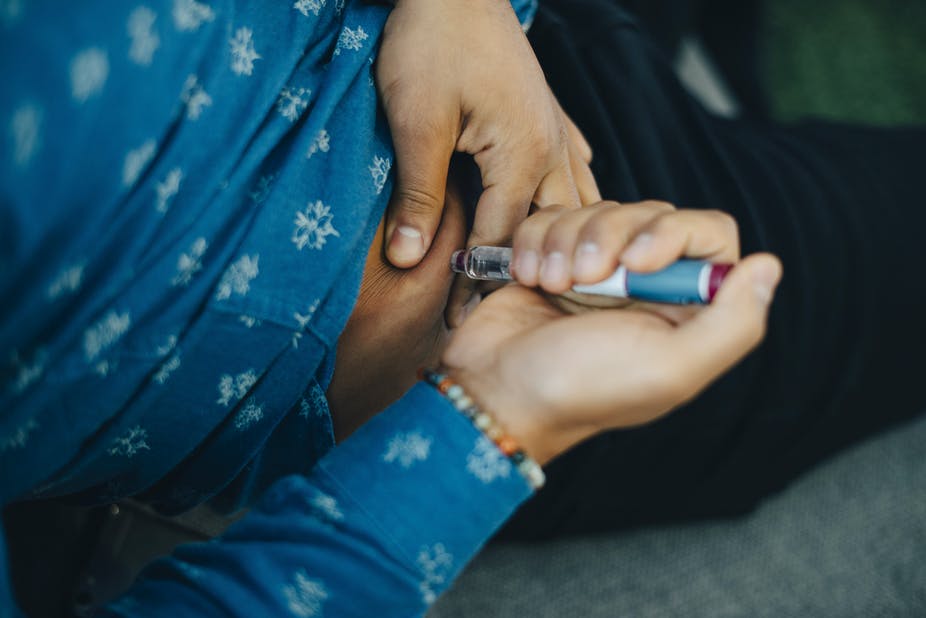
Maskot/Maskot via Getty Images
Insulin is as essential as water for many people with diabetes. Of the more than 30 million Americans with diabetes, approximately 7.4 million rely on insulin to manage their condition. But it is one of the most costly drugs on the market, and the COVID-19 pandemic has intensified the already rampant problem of insulin hoarding or rationing.
Not only is diabetes associated with an increased risk of severe COVID-19 infection, but COVID-19 is also associated with both an increase in new diabetes diagnoses and a worsening of preexisting diabetes complications. By September 2021, death rates for people with diabetes were 50% higher than before the pandemic, a net increase of more than twice the overall death rate of the general population.
I am a pharmacist who studies ways to improve clinical, economic and quality-of-life outcomes in vulnerable populations. My recent study on how insulin prescription rates have changed because of the pandemic underscores the challenges that people with diabetes face in accessing care.
Insulin is vital for people with diabetes
Diabetes affects how the body converts food into energy. Usually when someone eats, the body breaks down the food into sugar that enters the bloodstream. The pancreas releases insulin that helps the sugar enter cells so it can be used as energy.
People with diabetes, however, are unable to absorb the sugar because their bodies either don’t produce insulin or are unable to use insulin well. To keep their glucose levels under control, people with diabetes may need daily insulin injections.
Without these daily injections, increased blood sugar levels can lead to severe health problems. The most common complication, diabetic ketoacidosis, is responsible for more than 500,000 days of patient hospitalizations each year.
Managing diabetes during a pandemic
Although insulin is a vital component of diabetes management, the pandemic has led many patients to forgo the prescriptions they need.
My recent study looked at the insulin prescription claims of 285,343 people in the U.S. between January 2019 and October 2020. In the first week of 2019, there was an average of 17,037 new and existing insulin prescriptions picked up by patients per week. This number increased by 11 claims each week leading up to the pandemic.
By the first week of the pandemic in March 2020, however, insulin prescriptions decreased significantly by an average of around 396 prescriptions. Prescriptions continued to decrease an average of around 55 per week as the pandemic progressed through to October 2020. This decline may result from a combination of health insurance loss owing to unemployment, restricted access to clinicians and pharmacies and rationing or stockpiling of medications by both pharmacists and patients.
And the effects of the pandemic on diabetes go beyond just insulin prescriptions. Diabetes management involves visits with a variety of health care providers and routine testing. But diabetes patients in the U.S. had a significant drop in usage of health care services in 2020 compared with 2019, because of clinic closures and reduced capacities, health insurance loss and transportation difficulties. Patients are left in a bind, risking potentially life-threatening complications from missing needed diabetes care as well as risking exposure to COVID-19 if they need emergency care for those complications.
Ongoing effects of care delays
As COVID-19 overwhelmed health care systems, people with chronic conditions like diabetes have experienced significant disruptions in routine and emergency medical care. By the end of June 2020, an estimated 41% of U.S. adults had delayed or avoided medical care.
Even now, with hospitals crowded with unvaccinated COVID-19 patients, nearly 1 in 5 American households had to delay care for serious illnesses in the past few months. These care delays have the potential to worsen chronic conditions and contribute to excess deaths directly and indirectly caused by COVID-19.
The full effect that the COVID-19 pandemic continues to have on diabetes management and care, however, has yet to be fully understood. More research on how the pandemic has affected people with diabetes is needed to ensure that these patients receive the care that they need.

